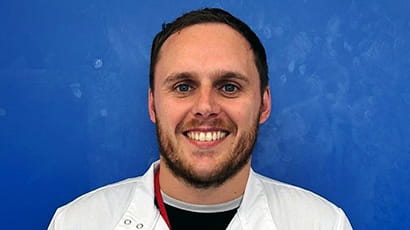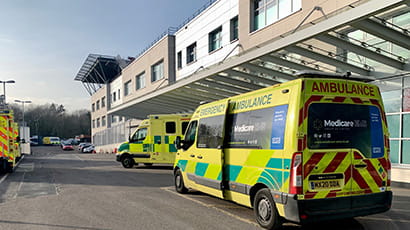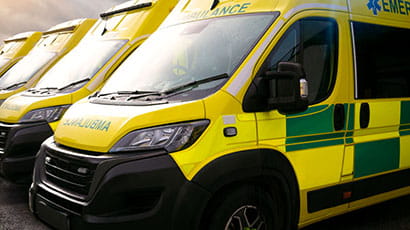Urinary tract infection device could reduce need for precautionary antibiotics

University of the West of England (UWE Bristol) researchers are supporting clinicians at the North Bristol NHS Trust to develop a device that can diagnose urinary tract infections (UTI) in a matter of minutes. Current diagnostic testing takes a few days and the new device could avoid instances when doctors prescribe antibiotics as a precautionary measure while waiting for test results. The project is funded by the National Institute of Health Research (NIHR).
Professor Richard Luxton, who is co-founder and Director of the Institute of Bio-sensing Technology at UWE Bristol said: "As well as speeding up the diagnostic process, this device is aimed at minimizing inappropriate prescription of antibiotics and hence supporting the aim of reducing antimicrobial resistance.
"Currently it can take up to three days to get a result for a urine sample sent to a microbiology laboratory. If the patient has ongoing symptoms, the GP will sometimes prescribe antibiotics before the result is back. This could be harmful to the patient, and also to the community at large."
The World Health Organisation (WHO) has warned of the risks of antimicrobial resistance, which is when bacteria build up a resistance to antibiotics. This is caused by over-prescribing antibiotics, resulting in standard treatments becoming ineffective and infections persisting.
The device, which will be about the size of a domestic toaster, is to be developed within the University's Institute of Bio-sensing Technology. It will work using a cartridge that contains antibodies to common UTI bacteria, and a protein indicating when an infection is present. A small volume of the patient's urine sample is poured into the cartridge, which is then placed in the new detection device, after which a diagnosis can be made quickly.
GPs currently diagnose UTI in patients based on their symptoms. Often they will check a urine sample for infecting bacteria and for an increase in white blood cells, which shows whether the patient's body is generating an inflammatory reaction to the infection.
But Professor Marcus Drake, Consultant Urologist from North Bristol NHS Trust and project Principle Investigator, said that as well as being slow, such methods are sometimes unreliable. "The new device will detect the infecting bacteria directly, giving a reliable indicator of the UTI. Current dipstick-type tests measure chemicals in the urine that suggest bacteria may be present, but these are not sensitive and may miss an infection," he said.
Every year urinary tract infections affect some 150 million people (men and women) worldwide, and an estimated four million British women. Over half of all women will develop UTI in their lifetimes. The infection leads to painful symptoms such as a burning sensation when passing urine and can sometimes lead to other significant complications such as kidney damage.
The development of the diagnostic device is in its early stages. Initially, the scientists gathered feedback from patient panels, which supported the research team through focus groups and direct feedback. This emphasised the importance of ensuring the test is safe, easy to use for nurses, inexpensive for GP practices, and easy to store.
The project duration is scheduled for three years to develop a prototype and do a preliminary test with real-life urine specimens. Over a subsequent three-year period, researchers will then further develop the diagnostic system to bring it in line with regulations, with a plan for the device to then be used in clinical trials.
Following this, the researchers hope to make it available to the NHS for use in GP surgeries for patients with suspected UTI.
Related news

12 December 2025
UWE Bristol’s environmentally conscious and student-focused accommodation wins three awards
Purdown View, the world's largest certified Passivhaus student accommodation development, has been recognised at Property Week Student Accommodation Awards.

13 November 2025
Alliance Medical and UWE Bristol launch UK’s first PET-CT postgraduate certificate
In a move set to transform imaging education, Alliance Medical (AML) and UWE Bristol have joined forces to co-design and develop the UK’s first PET-CT Postgraduate Certificate (PG Cert).

10 November 2025
Lessons from Low Traffic Neighbourhoods will drive better public engagement, study finds
Lessons from Low Traffic Neighbourhoods have informed a new toolkit to improve engagement with the public on challenging local street issues.

29 September 2025
Smartphone use hitting struggling pupils hardest, major study finds
Young people struggling with their studies at school are much more likely to have negative experiences on their smartphones than their better performing peers, a major new study has found.

11 September 2025
New study to investigate augmented reality as an intervention for emotionally based school avoidance
A UWE Bristol researcher will support a new study exploring whether an augmented reality board game can help young people with emotionally based school avoidance (EBSA).

28 July 2025
Student wins bronze medal at World Aquatics Championships on her graduation day
UWE Bristol sports rehabilitation student Izzy Thorpe made waves at the World Aquatics Championships winning a bronze medal in artistic swimming on the same day she was meant to be crossing the stage at her university graduation ceremony.

28 May 2025
Leading organisations fighting to end youth violence in cities join UWE Bristol event panel
Leaders from Bristol-based Empire Fighting Chance and Canadian non-profit REACH will speak at the next Bristol Distinguished Address Series.

09 May 2025
UWE Bristol among first universities in UK to introduce sanitary waste bins in male toilets
UWE Bristol is among the first universities in the UK to introduce sanitary waste bins in male toilets for the disposal of incontinence products.

11 April 2025
UWE Bristol academics among emerging scientific leaders to receive share of £7.6m for health research
Two UWE Bristol researchers are among the recipients of a £7.6 million investment from the Academy of Medical Sciences aimed at tackling urgent health challenges.

09 April 2025
New research to support a thriving health and care workforce is launched
A national research partnership will explore ways to support wellbeing and sustainability in the NHS and social care same day and urgent care workforce.

10 March 2025
UWE Bristol to explore the power of open water swimming at upcoming event with The Wave founder Nick Hounsfield
An inspiring tale of grit and resilience will be told to audiences at the first BDAS event of 2025 as UWE Bristol welcomes Nick Hounsfield, founder of The Wave.

28 February 2025
Paramedics in GP surgeries may ease workload but not NHS costs, study finds
Paramedics working in GP surgeries help reduce GP workload but do not contribute to cost savings to the NHS, according to the first major study of the clinical and cost-effectiveness of paramedic compared with GP consultations.






